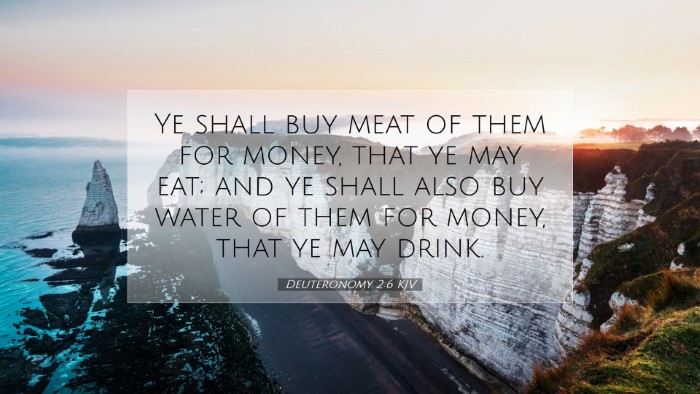Commentary on Deuteronomy 2:6
Deuteronomy 2:6 states: "Ye shall buy meat of them for money, that ye may eat; and ye shall also buy water of them for money, that ye may drink."
Contextual Background
In this passage, the Israelites are on the verge of entering the promised land after a lengthy period of wandering in the wilderness. They are reminded of the necessity to approach neighboring nations with respect and propriety, especially as they seek sustenance during their travels.
Matthew Henry's Commentary
Matthew Henry emphasizes the importance of God's providence and provisions. He notes that the Israelite’s journey through the wilderness serves as a reminder of divine guidance, and that even in dire situations, God’s people can find the sustenance they need through lawful means.
Henry elaborates on the significance of buying food and drink, suggesting that this was not merely a transaction but a means by which the Israelites could engage respectfully with the lands they were passing through. The act of purchasing, rather than taking what was needed by force, highlights the principle of interacting with others justly and ethically.
Albert Barnes' Notes
Albert Barnes provides insight into the implications of this verse for community relations. He points out that the instruction to buy rather than to take underscores a commitment to peace and goodwill. Barnes asserts that this reflects a broader theological theme found throughout Scripture concerning hospitality and the proper conduct of God’s people.
Barnes also mentions that this directive illustrates a gradual transition for the Israelites from their mindset of dependency and wandering towards establishing themselves in the land God promised. The need to purchase supplies signifies a move towards economic independence and responsibility.
Adam Clarke's Observations
Adam Clarke focuses on the practicality of the command within the socio-economic context of the ancient Near East. He explains that during their journey, the Israelites were to maintain a level of dignity and decorum in their interactions, fostering goodwill with surrounding nations.
Clarke also highlights that the act of purchasing was part of a larger covenantal relationship, suggesting that God expects His people to act justly and with integrity in all their dealings, not only with fellow Israelites but also with foreigners.
Theological Insights
Together, these commentaries illuminate the profound theological implications of Deuteronomy 2:6. Firstly, it reflects God's provision as He sustains His people in transitions. Although they were in a foreign land, they had access to what they needed through fair means.
Secondly, the ethical dimension of buying emphasizes a lifestyle that includes treating others with respect, regardless of their status. Pastors and theologians can draw on this principle as it relates to current discussions on social justice and ethical living within the community.
Practical Application
For pastoral application, Deuteronomy 2:6 serves as a reminder to congregations about the importance of ethical behavior in all aspects of life, including finances and interpersonal relationships. The lesson here is to approach all dealings with honesty and integrity.
Students and scholars might explore the implications of such directives in the broader narrative of Scripture. This might lead to discussions regarding themes of justice, mercy, and the nature of God as a provider throughout biblical history.
Concluding Thoughts
Ultimately, Deuteronomy 2:6 is not just an instruction for the moment but a significant theological lesson reflecting God's ongoing relationship with His people. The integration of sustenance, ethical conduct, and God's providential care encapsulates the essence of living a life obedient to God's commands.


